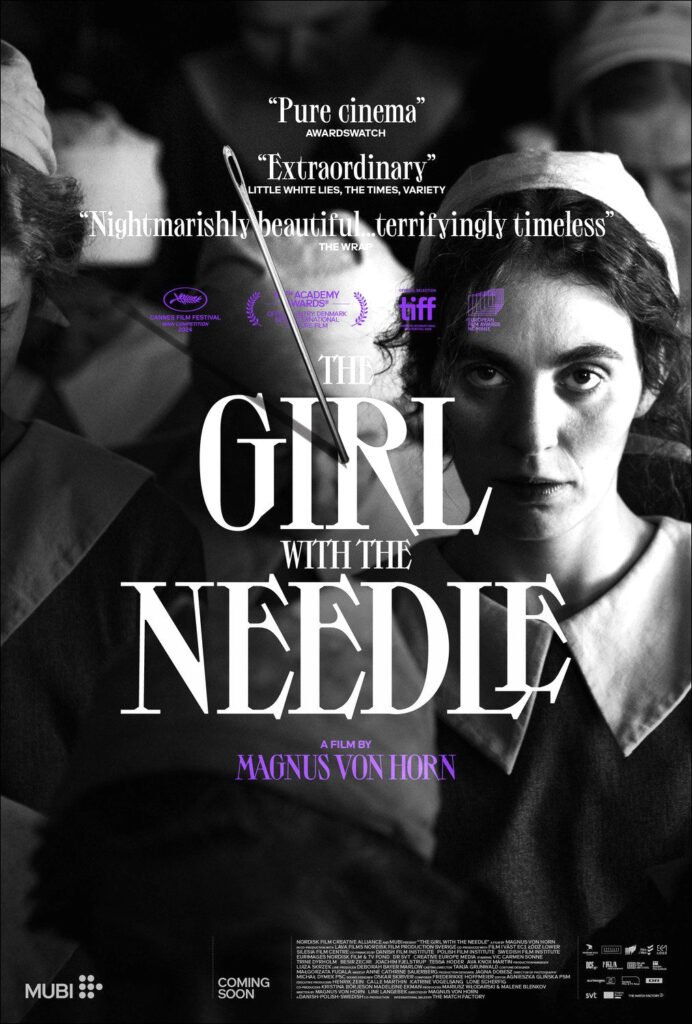In the realm of cinema, Magnus von Horn emerges yet again, crafting his third feature, a striking departure from his prior works that shimmer in contemporary narratives. Where once he explored modern landscapes—first in the haunting “The Here After” (2015), set against the Swedish backdrop, and then traversing the gritty urban expanse of Poland in “Sweat” (2020)—now he plunges into the depths of history with a period piece. The film, “The Girl with the Needle,” unfolds against the desolate horizon of post-World War I Copenhagen, executed in moody black-and-white that breathes life into its solemn themes.
This cinematic endeavor presents a duality; Karoline, our protagonist, crafted from the depths of fiction, channels the struggles of the working-class life during that tumultuous era. The poignancy of her existence—as a seamstress battling the specter of desperation—is palpable. She finds herself ensnared in the relentless grasp of poverty, her once-comfortable life stripped away since her husband, Peter, has vanished, likely a casualty of the war’s horrors. As the factory owner’s attraction complicates her bleak reality, the film’s narrative spirals into a tumult of emotional complexity.
Enter Dagmar, a figure rooted in the annals of reality, whose story intertwines with Karoline’s as a fragile friendship emerges amid the chaos. Yet, the film doesn’t shy away from the haunting realities of their time; its unrelenting gaze captures the raw essence of the human condition, from the grimness of unwanted pregnancy to the desperate search for autonomy in a callous world. The title itself, an evocative allusion to the sharp realities faced by women in tumultuous times, hints at the intimate yet turbulent themes explored throughout.
Visually, the film dazzles through the skilled craftsmanship of Michal Dymek, whose black-and-white cinematography invokes a bygone era, yet resonates deeply with contemporary sensibilities. The lack of sentimentality in its portrayal of human experiences—punctuated with moments of unexpected tenderness—creates a resonance reminiscent of silent films, enveloping the audience in a cocoon of emotional depth.
While some may argue the narrative leans slightly toward manipulation, the robust production design by Jagna Dobesz, coupled with Frederikke Hoffmeier’s spine-tingling score, crafts a world that feels hauntingly real. The film’s critique of society remains imperative, prompting viewers to ponder their own moral compass as they navigate the harrowing landscapes presented.
Von Horn, alongside co-writer Line Langebek, stands resolute in delivering a narrative that demands empathy for its characters, refusing to dilute their essence. The performances of Vic Carmen Sonne and Trine Dyrholm shine brightly, each actress breathing life into their respective roles with striking authenticity.
“The Girl with the Needle” is not merely a film; it is an experience—one that resonates long after the credits roll. It challenges, it provokes, and ultimately, it etches itself into the heart of those daring enough to confront its stark truths. In this interplay of history and fiction, von Horn lays bare the human spirit’s endurance against overwhelming odds. As we stand at the precipice of a horizon stretching toward a bleak yet hopeful future, it is a film of undeniable distinction waiting to be unearthed amidst the shadows of time.
Original title: Pigen med nålen
Director: Magnus von Horn
Producers: Malene Blenkov, Mariusz Wlodarski
Cast: Vic Carmen Sonne, Trine Dyrholm, Besir Zeciri, among others
Release Information: Denmark/Poland/Sweden, 123 mins, US Release on December 6, 2024; UK Release on January 10, 2025, Rated 15.

